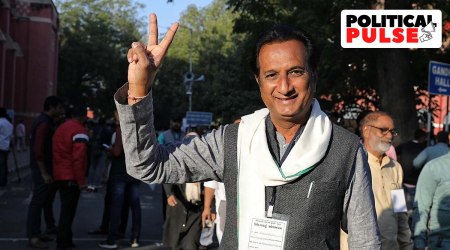THE EVENING Saudi Arabia defeated Argentina, manager Lionel Scaloni called for an early dinner.
Usually, the players take dinner in groups, or sometimes alone, but this time Scaloni insisted on “dining together”. The mood across the table was understandably sombre. No jokes, no banter, just the echo of spoons and knives clanking in the large dining room of the Qatar University, where they are staying. Hours ago, they had an extensive meeting on how to focus on the remaining tournament — not a word was uttered on the defeat. And during dinner, Scaloni’s brief was not to talk a word about their game.
Towards the middle of dinner, he informed his players about two changes in their practice routines. First, they would advance their sessions from 6 pm to 3 pm, so that players get used better to the sapping heat of Doha. The next was to let the players bring their families into the ground, for the manager believed that there was no better therapy than the sight and support of family. The training ground the next day resembled a family reunion, with the players’ wives, children, parents and friends all in the ground in a kick-about.
‘Uniteve’ journalist Fernando Agusta says the players returned from training a reinvigorated group, and not the “dead souls” as Lionel Messi captured the locker-room mood after the shock defeat. “Moments with family members are important to unwind and enjoy the World Cup. It helped us a lot in dealing with the defeat and then bouncing back,” Alexis Mac Allister, one of Argentina’s bright sparks in this tournament, said.
The defeat was not just a wake-up call but a unifying force.
Scaloni said after defeating Netherlands: “Argentina has a team spirit because we know how to face every situation in the game… We showed our personality. We faced the difficult moments of the game. The team spirit and knowing what we want and need — in every moment of the game — is crucial for us.”
Standing by them through the toughest moment of their career, he had won their trust. The players were willing to stretch the limits of their game, mind and body for the country. “We will break our backs for Argentina,” Lautaro Martinez said in a press conference.
Shortly, Scaloni and his assistants — Pablo Aimar, Walter Samuel and Roberto Ayala, all club legends in their youth — got together and chalked up plans and counter-plans. Like deploying the 3-5-2 system with success against the Netherlands, to counter their own 3-5-2. Resolute and robust, the Dutch barely got a sniff, until Scaloni redeployed the 4-2-3-1 in the latter stages.
Argentina also shuffled their players around — they have not started with the same eleven in all five games. Replacing Julio Alvarez for Lautaro Martinez furnished them with mobility and incision upfront, his ability to play across the frontline posing more threat to the defence. Like the 22-year-old, a spate of fresh stars emerged, like Enzo Fernandez, Nahuel Molina, Alexis Mac Allister and Marcos Acuna. Goals and assists flew from everywhere.
But it was still Messi who was their soul and heartbeat. With that most dreamy of assists against the Netherlands, he became the most prolific assist-supplier in the knockouts of World Cup (five). He has also scored twice in as many knockout games. Before this, he had scored none in nine games.
He has emotionally galvanised this young Argentina side. Messi himself has not shed so much emotion on the turf as he has in this tournament. Usually restrained and self-effacing, he has been a riot of emotions, unpacking joy and agony, rage and ecstasy, petulance and relief. He has been un-Messi, yet so-Messi, conjuring moments that change matches.
His bond with the coach has been special, too. There are parallels besides being namesakes. Like Messi, who was his teammate in the 2006 World Cup, Scaloni has spent much of his time away from his home country, filing in and out of leagues in Europe. When he was elevated as the manager, he was criticised for not being “Argentine enough”. But in three years, he has muted them by winning the COPA, setting a record winning streak of 36 games and now steered them to the semifinal.
But his biggest contribution was winning Messi’s faith when he took charge in 2019, with rumours swirling that the superstar would retire from international football. But Scaloni personally called and explained his vision and blueprint, and convinced him to stay.
A raft of coaches, ever since the genius of Messi bloomed, had centred their game on him but failed to strike a balance between him and the rest. But Scaloni found this elusive balance — the team is Messi’s yet at the same time the collective. Messi playing for the rest, the rest playing for Messi.
Scaloni, though, is not a man of emotion. He knows the flip-side of being over-emotional. It could sometimes clutter clear thinking, it could invite an impetuous moment that could end up crashing the fairy-tale farewell script. He told his team: “The sensations of joy. The match is over and that’s it. Tomorrow we have to get back to preparing for the match. The joy is very short-lived. You have to have a balance when you win and when you lose.”
Meanwhile, Scaloni has become so popular that the team as well as him is called La Scaloneta, after a popular eponymous song by Numana. He though hates the moniker. “I’m Scaloni. I don’t like it, but there’s no turning back,” he once told the daily Clarin. But he reinstalled joy on their face, harnessed the best out of Messi in Argentina’s stripes and made the team work as an intense, unflappable unit, And That day when they lost to Saudi Arabia, when Messi said they were dead souls, looks like an eternity ago. But that match was to turn their World Cup around.









